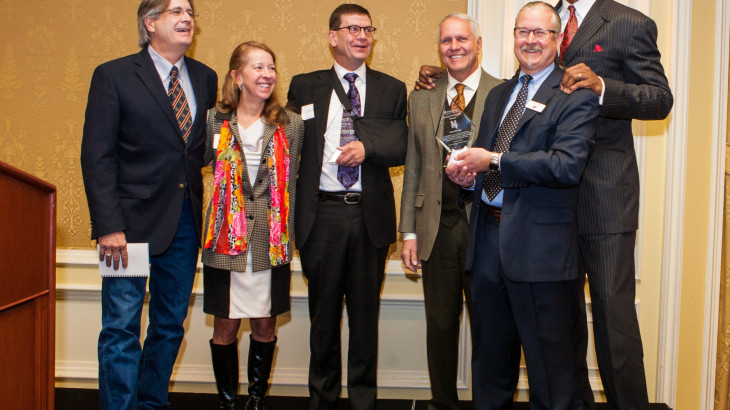In recognition for helping students on the autism spectrum, the Columbus Community Center – a Salt Lake City center providing support services for people with disabilities – awarded the University of Utah’s Lassonde Entrepreneur Institute and startup NeuroVersity with the Social Enterprise Award at its Ninth Annual Dignity through Work Recognition Event earlier this month.
The award honors the work the Lassonde Institute has done in partnership with NeuroVersity, a faculty startup that helps teach vocational skills to students on the autism spectrum by teaching them how to use 3D-modeling software (SketchUp Make). The training taps into the strength many of these students have for detailed projects and visual-spatial reasoning and orientation.
“It’s a great honor to receive this award,” says Troy D’Ambrosio, executive director of the Lassonde Institute, an interdisciplinary division of the David Eccles School of Business. “It shows how we can have a great impact on the community by bringing together faculty researchers, students and community members.”
NeuroVersity launched in 2013 with help from students in the Lassonde Institute. Since then, the company has conducted numerous pilot programs across the country and secured substantial financial support from organizations including the Utah Governor’s Office of Economic Development, Utah Autism Foundation, University of Utah, McCarthy Family Foundation, Autism Speaks, Autism Council of Utah, Google and Trimble, Inc.
Last summer, NeuroVersity and the Lassonde Institute partnered with the Columbus Community Center for one of the latest pilot programs. They created a workshop where local students learned the 3D-modeling software then worked on a “real world” project presented by Big-D Construction.
The University of Utah faculty members behind NeuroVersity are Scott Wright, a professor in the Gerontology Interdisciplinary Program in the College of Nursing, and Cheryl Wright, a professor of family and consumer studies.
“We have teamed up with the Columbus Community Center to bring a great learning opportunity to the most underemployed group with disabilities in the U.S.,” Scott Wright says. “Our company helps transition-aged students with autism turn their strengths into highly sought-after abilities and technical skills. Columbus is helping us take our efforts to the next level and reach even more people.”



